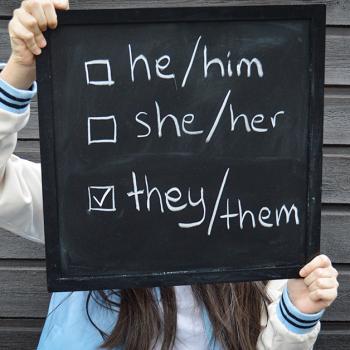 A friend of mine who is an Evangelical Christian noted that on more than one occasion I’ve called them out for failing to adequately show love to those of us who have left their ranks. In my review of God’s Not Dead, I criticize the film’s creators as well as its adoring fans for so badly caricaturing and dehumanizing atheists in the movie. And in my somewhat confrontational piece “Your Love is Toxic,” I list four common demonstrations of Christian love that aren’t really love at all. After reading that, my friend finally asked, “So what is loving, then?” After describing so many things that aren’t love, what would loving an atheist look like, anyway?
A friend of mine who is an Evangelical Christian noted that on more than one occasion I’ve called them out for failing to adequately show love to those of us who have left their ranks. In my review of God’s Not Dead, I criticize the film’s creators as well as its adoring fans for so badly caricaturing and dehumanizing atheists in the movie. And in my somewhat confrontational piece “Your Love is Toxic,” I list four common demonstrations of Christian love that aren’t really love at all. After reading that, my friend finally asked, “So what is loving, then?” After describing so many things that aren’t love, what would loving an atheist look like, anyway?
My first reaction is to say that love would look like the opposite of the four things I listed in that article. Instead of shunning and disassociating, love looks like accepting and including. Instead of withholding or giving with strings attached, love looks like giving to those in need, and doing it in such a way that you do not place expectations on the recipient to give you back something in return. Instead of crusading and proselytizing, love looks like accepting people the way they are, respecting their personal boundaries, and not trying to change who they are to become more like you. Unfortunately, many people’s religion will not allow them to do this because it dictates that people are bad, broken, and needing something that they have to offer. If you could only step outside your own box for just a minute you’d see how awful that looks from the outside.
When you think about it, though, it’s a little sad that we have to give a tutorial on this at all. I suggest it shows that the Christian tradition (certainly as it’s popularly known) isn’t as superior at teaching you how to relate to others in a healthy way as the people within that tradition suppose it is. I would argue that any tradition which says, “Love this person or else” carries an element of coercion and emotional manipulation that will be inescapable until you learn to question some very basic assumptions. As long as you really believe I’m doomed to Hell, nothing you do around me will be completely normal and healthy. But I’m going to set that bigger ideological question aside for a moment and just talk about what it looks like to love an atheist in practical terms.
First, a caveat: When I asked my atheist friends what loving them looks like, the most common response I got was: I don’t want what they call love. I want respect. They can keep their “love.” Too often Christians have been taught to see love as a proprietary virtue, as if it’s uniquely a possession of their tribe. But this tinges their love with an unmistakable air of condescension and manipulation. My friend Hannah said it perfectly:
I think using the word ‘love’ is the wrong terminology. When a stranger tells someone they ‘love’ them, it comes across as superficial and insincere. It cheapens the word. When Christians tell atheists they ‘love’ us, it’s patronizing. I would suggest they throw that word out altogether!
As an atheist, I don’t want ‘love’ from Christians. I just want freedom to make my own choices without judgment, ridicule, social isolation, and demonization. I just want a little respect for exercising my right as an individual to believe or not believe in what I choose.
That was a recurring theme among those who responded to my question, and I think that sentiment undergirds each of the responses summarized below.
TEN TIPS FOR LOVING AN ATHEIST (IF YOU’RE RELIGIOUS)
1.) If you really care about us, do more listening than talking and take time to understand where we’re coming from. Love implies empathy. If you can’t understand why we don’t believe, then take the time to try and understand it. If you really love us, you will also take time to consider how many times we’ve already been exposed to whatever you feel the urge to say to us. If we’ve heard what you’re about to say five hundred times, do you really think saying it one more time will have a more positive effect than the previous times we heard it?
2.) While you’re at it, take a minute to watch “What Atheists Wish Christians Knew About Us” if you haven’t before. It’s an excerpt from an interview I did at a church in Jackson, MS, and it was essentially my “coming out” talk. After a year and a half, people are still telling me that talk helped them open up constructive dialogue between themselves and their very religious friends and family.
3.) If you decide you must interrogate us about why we don’t believe what you believe anymore, you should be prepared to hear answers that will upset you. If you can’t take hearing someone speak negatively about beliefs you hold very dear, don’t ask us about those things. Why walk into something you know will only lead to an argument?
4.) Focus on what we have in common. Is it really that hard to find things which don’t divide us? Do we have any common hobbies, common interests, common goals or occupations which could unite us in friendship? If you really care about us as people and not as notches in your belt, you’ll focus on building our relationship around those things and set aside your compulsion to make us be something other than what we are. I know you feel converting us is the most important thing you should be doing, but if you really trust your God, then stop trying to do his work for him.
5.) Learn not to speak to us in a patronizing, parental tone. It sounds condescending whether you want it to or not. Learn how to recognize when you’re being preachy. You think I’m broken and you want to fix me. But I think I’m fine the way I am, and the more you talk to me like I’m broken, the less I feel you really know me.
6.) Practice not talking differently about us when we’re not around. When you make a habit of thinking and saying condescending things about us, you might not say them when we’re around, but it affects your behavior despite your efforts to hide how you really feel. We can tell these things, you know.
7.) Consider the possibility that “I’m praying for you” is a phrase that only has meaning for you. And if it only means something to you and not to the person you’re addressing, why are you doing it? Do you not see that it’s self-serving to knowingly offer something that you know is meaningless to the other person? How egocentric can you be? How about we tell you we’re going to say a magic druid chant over your business? Would that touch your heart or just make us look a little creepy?
8.) If at some level you could acknowledge the possibility that you could be wrong about your religion (just as you ask us to suppose about our disbelief in God), that simple admission could infuse your interaction with just enough humility to make you a bearable person to be around. If you’re one of those who won’t admit even the slightest possibility that you could be wrong, you’re probably a pain in the a** to be around.
Perhaps there is a God but you’ve misjudged him. Maybe he cares less about believing in him and cares more about people being kind and accepting toward each other. What if God is blessing the world through the lives of non-Christians and cares not one whit what they actually believe about him? It’s possible, right? How would that change your behavior toward us?
9.) Consider the possibility that some former Christians have been on the receiving end of very bad treatment at the hands of people representing your faith. Consequently, you should realize that many of us have triggers that you’ve probably never thought could be triggers for someone. Some have had what legitimately qualifies as abuse, and certain conversations, accusations, and even catch phrases can set off PTSD for them. Even the sound of some songs can send people under a pile of pain and stress because they’ve been treated so badly by others.
10.) Take a good, long, critical look at the notion of eternal damnation. If you question nothing else you were taught to believe, at least question this one as sincerely as you can. It’s an atrocious, barbaric belief, and those who hold it will be ten times more likely to say and do manipulative things because of it. I am convinced that this single belief is responsible for more bad blood between Christians and non-Christians than anything else. It’s an awful doctrine and it’s past time for it to go.
Finally, there were a handful of excellent responses by friends I have to include here because they’re just perfect:
Damon: “If you have to explain, ‘I’m doing this out of love,’ it ain’t love.”
Robert: “Treat us like you did when you thought we were Christian.”
Jason: “Tell them WWJD with the caveat that everyone in this region has been thoroughly exposed to The Message. WWJD in that situation? They wouldn’t expect him to be so unwise as to flog a dead horse.”
[That’s an excellent point, btw, and one which deserves a post all its own. I think the church has spent so many years learning evangelism from Bible stories in which the audience was pre-Christian, while our culture is thoroughly post-Christian. The way you relate to former Christians should be very different from the way you preach your message to people who have never heard of it]
Deanna: “To me, it’s just scary that a Christian even has to ask this question. Showing love is essentially just having boundaries and respect. It’s letting adults live the life they have chosen to live without imposing your judgments and treating them the way they want to be treated not the way you want to be treated. There isn’t a magic recipe to loving an atheist, it’s just practicing empathy and showing respect that an atheist is an individual human being not an abstract label.”
Ken: “Wanna show love? Learn my language. Understand how to argue. Learn how to recognize a logical fallacy and refrain from using them. I love the argument. Don’t stop arguing with me, just learn how to do it.”
Shanon: “Acceptance of our personal choices involving religion and respect in regards to our ability to make those choices for ourselves. Seek out similarities and engage us in conversation on those grounds. There are still plenty of ways to nurture a relationship and demonstrate care. Atheists like words of encouragement, hugs, and baked goods, just like anyone else.”
And lastly, Captain Cassidy, who always knocks it out of the park:
“I’d tell such an interested Christian first to quit trying to change and fix me, and to quit looking at me like an inferior sub-human with no ability to love, no capacity for morality, and no reason to live. Don’t try to “help” me unless I ask for help. Talk to me with no agenda of conversion. AND FOR F***’S SAKE, QUIT THREATENING ME. I’m not looking for love, but it’d be nice to at least get courtesy and respect out of that lot. I’d settle for those. But they’re rarer than hen’s teeth to encounter in fundagelicals especially. The more indoctrinated someone is, the less empathy and humanity they seem to be able to show. Someone commenting on my blog called it a “stepford wife” mentality and I’d have to agree.
“The big problem–the biggest one maybe–is that for 20 or 30 years Christians have been maneuvering themselves into the role of Designated Adult for the rest of humanity. They genuinely believe that if they all disappeared, the world would perish in chaos and flames. They really think that “loving” people means strong-arming them into compliance and threatening them into silence. They’ve been redefining love to mean a weird codependent enmeshment for so long that they don’t even realize how bad it is or that things used to be different. As the old saying goes, they ought to get down off that cross; someone needs the wood.”
There’s plenty more to say because this is a really big topic. What would you add? What advice would you give to your very religious friends, family, or coworkers about how to show you love?











